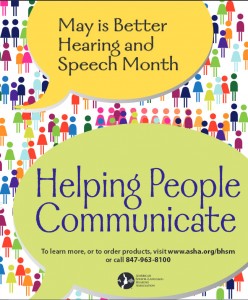Avoid Cross Cultural Communication Breakdowns: Get Face-to-Face!
When the person you are speaking to is hard to understand, communication on the phone is even harder.
Continue Reading No CommentsWhen the person you are speaking to is hard to understand, communication on the phone is even harder.
Continue Reading No Comments May is Better Hearing and Speech Month for my professional association, the American Speech and Hearing Association (ASHA).
May is Better Hearing and Speech Month for my professional association, the American Speech and Hearing Association (ASHA).
It is a great month to celebrate! Have you ever thought of communication as a right? From the Universal Declaration of Communication Rights it says,
“Communication is the most fundamental of human capacities. People need to be able to communicate to fulfill their social, educational, emotional and vocational potential.”
Barriers to communication impair an individual’s ability to …
Continue Reading No Comments
Your audience will be distracted by them (instead of listening to you!)
Continue Reading No CommentsIt’s hard to believe that the Olympics are almost over and there will be no more late nights! I hope that you have been enjoying these tremendous athletes and all their heartwarming stories!
Continue Reading No CommentsHere is a riddle for you: When is it ok to chew gum and give an interview in front of millions of people?
Continue Reading No CommentsPairs of sound in English that are made exactly the same except one is voice and the other is not, are called minimal pairs. The sounds in English that are made without using the vocal cords are called “voiceless.” Here are some examples…
Continue Reading No CommentsThe word “you” is commonly used in English. Since it is also a weak word (unless it is intentionally stressed), it is often reduced when linked to negative contractions. Here are some examples…
Continue Reading No CommentsSome people may argue that Americans have learned to be sloppy speakers because they aren’t very precise with their diction and reduce or eliminate sounds and words. But we often minimize/eliminate sounds logically and conveniently to create a smooth, natural flow of speech. Here is an example…
Continue Reading No Commentssrc=”
”When we connect words in sentences, the endings of the words in the sentence sometimes change to create a smooth, natural flow. Here is an example of an insertion or the addition of a letter to create a fluid sound in English.
Continue Reading No CommentsWhen we connect words in sentences, the endings of each word in that sentence sometimes changes to create a fluid flow. They may become reduced (less pronounced), they may be moved to the next sound or another sound may be inserted into the sentence. Here is an example of the way ending sounds get moved to the next word.
Continue Reading No Comments